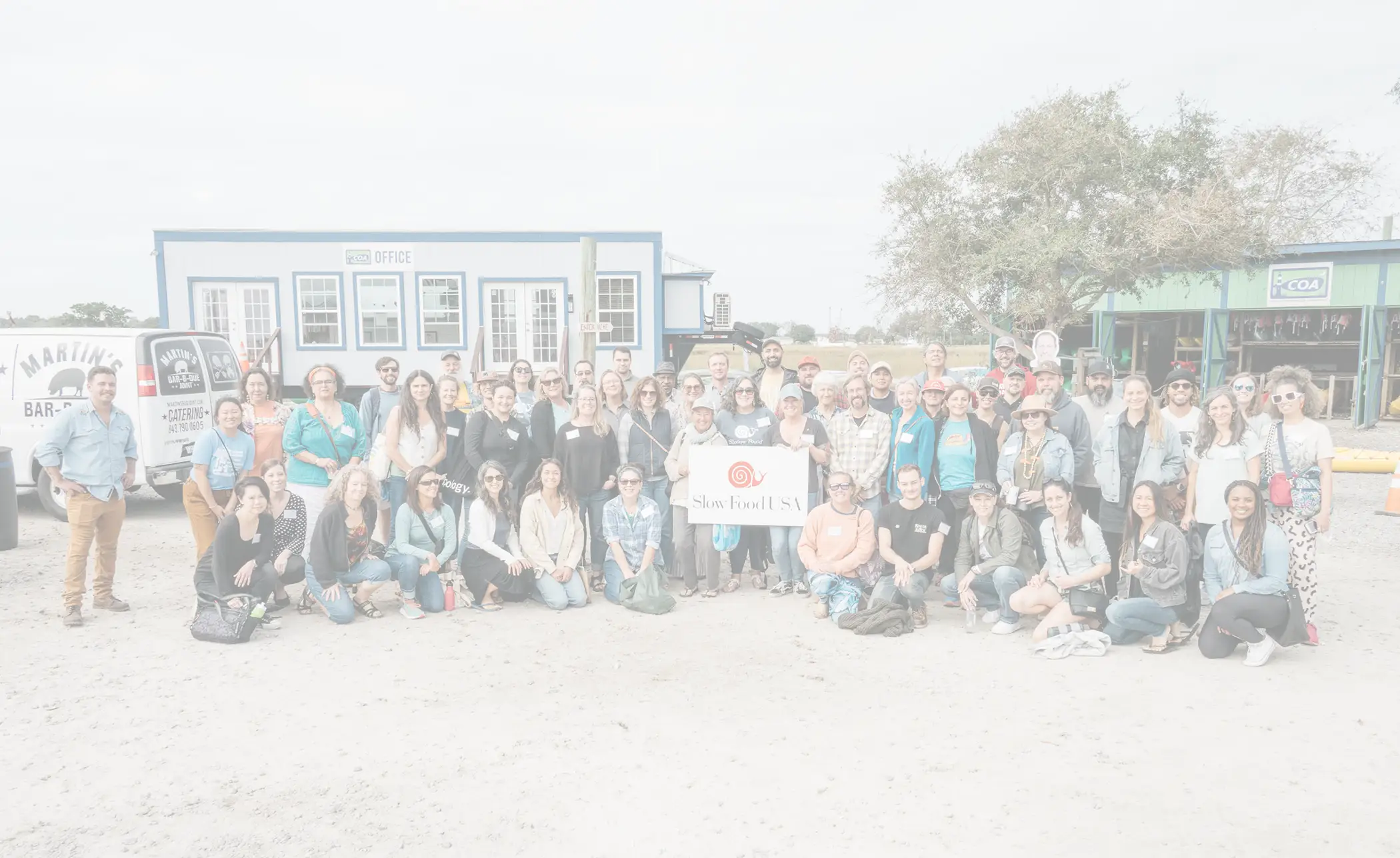Ed. Note: Below is a first-person account of how Slow Fish 2024: Charleston unfolded from colleague Hamida Kinge, Content Strategist with North American Marine Alliance. This was her first Slow Fish gathering, and she colorfully captures the manifestation of the event theme of “Crew Together,” as three people who were instrumental in coordinating, planning and executing the event were either unable to attend or had to leave early. Her story is a reflection of the galvanizing unity of the network. Enjoy!
By Hamida Kinge
Last month, Charleston, SC, transformed into a vibrant hub of activity for Slow Fish 2024. Fishers, fishmongers, chefs, advocates, policy experts, scientists, and educators from across North America came together to share values rooted in food justice, sustainability, and community.
As a newcomer to Slow Fish, I had the chance to witness this year’s theme, “Crew Together,” materialize in real-time. The first example came when Slow Fish North America network coordinator Colles Stowell, fell ill and couldn’t attend. Yet the spirit of the movement he and the planning team helped build was evident when fellow conference coordinator SFUSA’s Director of Programs Mara Welton worked with NAMA’s Niaz Dorry and Brett Tolley to step in as hosts and facilitators across the three-day gathering.
Participants engaged in some of the most urgent conversations of our time about seafood, ranging from Tribal food sovereignty and local processing infrastructure, to effective seafood marketing, utilizing the whole fish, fair access to ocean resources, and policies that protect fishing communities.
Here’s a snapshot of what I experienced as a first-timer at the gathering:
Gathering for the Waters: A Welcome
The gathering took off at the historic Sottile Theatre in downtown Charleston with welcomes from hosts Niaz and Brett. Indigenous Alaskan fisher Melanie Brown then gave a land acknowledgment. With some guidance from local Slow Food member Julie Shaffer along with her own research, Brown found that the region’s first peoples, whose bloodlines still run through the land, are now part of the confederated Wassamasaw Tribe.
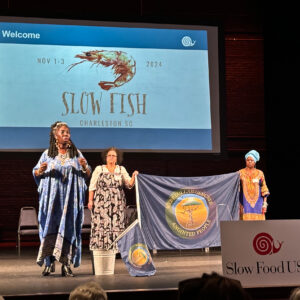
Queen Quet sets the tone for the gathering by telling the story of the Gullah Geechee peoples’ history and culture in the Low Country.
Then, Queen Quet, Chieftess of the Gullah Geechee Nation made her entrance from behind the audience, singing the Black spiritual hymn “Wade in the Water.” After sharing a powerful story, she invited attendees to form a circle around the theater’s perimeter, close their eyes, breathe, and direct their thoughts to gratitude for the water that sustains us. She also reminded us of the power of working together toward a common goal.
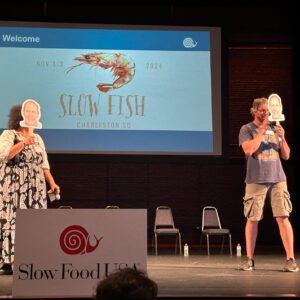
Niaz Dorry and Brett Tolley of North American Marine Alliance “pretending” to be Colles prior to discussing where Slow Fish has been, where it is now, and where it’s headed. This image was both a shock and a heartwarming salve for Colles who was back home in Maine. Photo: Kevin Scribner.
After Brett talked about what Slow Fish has been up to since the last in-person gathering in 2018, we heard from the key chord speakers. Among them was Captain Charlie Abner, a commercial fisherman with 50+ years of experience working the waters of South Carolina, Georgia, Florida, and beyond. He talked about his initiative to train the next generation of young Black fishermen, along with his work co-founding a seafood cooperative that’s deeply rooted in South Carolina’s shrimping traditions.
Other key chord speakers included Buck Jones of the Columbia River Intertribal Fish Commission in Oregon; Captain Kindra Arneson of Arnesen Seafood in Louisiana; Kerry Marhefka of Abundant Seafood in Charleston, S.C.; and Chef Dana Honn of Carmo restaurant in New Orleans, Louisiana.
More Fish Value for Fish with Values
Saturday was jam-packed with sessions at the College of Charleston. Among those I attended was a session on full fish utilization and zero-waste initiatives underway in New Orleans, Honolulu, and Portland, OR.
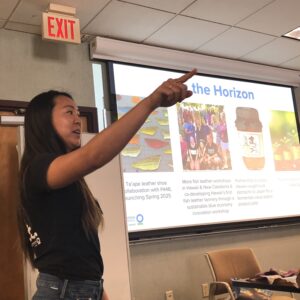
Jhana Young describes the Ta’ape Project aimed at whole fish utilization, including fish leather at the College of Charleston. Photo: Crowd sourced
Jhana Young of Conservation International Hawai’i shared the many ways her organization is working with chefs on the Ta’ape Project – a multi-layered initiative to turn an invasive fish species, the bluestripe snapper (ta’ape), into a sustainable food source. Jhana’s team has built a coalition around this effort, bringing chefs on board by educating them about ta’ape’s benefits.
The Ta’ape Project’s campaigns have included cooking demos, restaurant specials, educational videos, and social media competitions. They’ve also partnered with several schools to offer chef demonstrations and fish-cleaning workshops. Celebrity chef collaborations and a grant from Patagonia clothing company have helped spread the project’s reach even further.
Also in the session, New Orleans Chef Dana Honn, owner of Carmo and an advocate for Gulf-based shrimpers, talked about Full Catch, a program in development to capture the full value of the existing Gulf seafood harvest, and to harness the many underused species in the waters around the region.
Through his new initiative, Southern Artisanal Food Enterprises, Chef Honn is seeking creative ways to utilize every part of the fish and to monetize the seafood waste stream. He also discussed piloting processes to improve both seafood quality and safety, such as Gulf-Sushi grade, to make sure fishers get the best exchange value for their catch. Chef Honn is prioritizing sourcing from regional, Tribal, BIPOC, and women producers, while tackling food waste and creating value-added products.
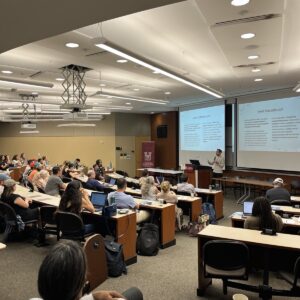
Don’t Cage Our Oceans Legislative Director James Mitchell leads a deep dive into aquaculture with values, explaining the benefits of the Domestic Seafood Production Act bill. Photo: Crowd sourced
Other compelling sessions from Saturday included deep dives into: aquaculture with values, hosted by James Mitchell of Don’t Cage Our Oceans; Indigenous voices in fisheries policy hosted by Melanie Brown of SalmonState; empowering USDA to support local seafood systems via the Farm Bill hosted by Elizabeth Dubovsky of Feeding Change Alaska; local processing hosted by Elizabeth Dubovsky; and community engagement around Slow Fish values hosted by Mara Welton and Ashley Hay Mitchell of Slow Food Charleston. Again the spirit of Crew Together shone through when Elizabeth stepped in to co-lead the processing discussion when the session leader had to cancel his trip last minute.
Crafting Seafood’s Story for the Public
That theme continued on the final day of activities, which took place on Bowen Island, when Slow Food USA’s Mara Welton was unable to attend. Once again, the team rallied, crewed together, and made sure the morning’s three breakout sessions were seamless.
I joined the Slow Fish Storytelling session, led by Niaz, which focused on brainstorming ways to reshape narratives about values-based seafood to reach a wider audience.
One of the central questions raised by this lively group was how to handle the word “sustainable,” which has sometimes created barriers to connecting with a broader public.
Among the most memorable ideas was that of Melanie Brown, who proposed a fishermen’s exchange program that would invite non-fishermen into their homes to get a close-up look at the techniques and challenges of the profession. By gaining hands-on experience and local perspectives, participants could gain a deeper appreciation for the work, empowering storytellers to share the true values of seafood with the world.
Another attendee, Laura, expressed enthusiasm for the exchange program. She also stressed the importance of simplifying the sustainable seafood message for the public. She said that a clear, accessible slogan, like “Buy American Seafood,” could reach more people.
Chef Valerie Erwin added that framing seafood around “sustainability” could make people with fewer resources view sustainable seafood as “something that benefits someone else at some other time in the future.” She said reframing seafood in terms of “security” might resonate more with a broader range of consumers.
Captain Kindra Arnesen echoed this, suggesting a shift from “sustainability” to food security, with potential narratives like “America’s fish for American consumers.” She said promoting American seafood as a patriotic choice could directly benefit American fishers.
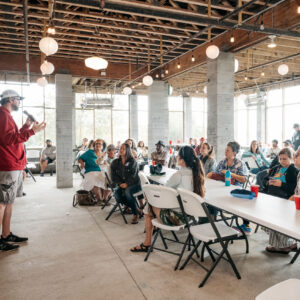
Brett Tolley of NAMA addresses the crowd prior to the breakout sessions on Bowen’s Island on Day 3 of the event. Photo: Ruta Smith
The other two breakout sessions focused on growing and maintaining stewardship of Slow Fish North America and its mission, and continuing the momentum of Slow Fish Rising Tide. The program brings Slow Fish values, content and storytelling to Slow Food communities around the continent and beyond.
A Lowcountry Seafood ‘Shell-abration’
Sunday was also the highly anticipated Slow Fish Festival, closing the Slow Fish Gathering with camaraderie, merriment, and a feast of local flavors. The morning wrapped up with a large group report-back session where attendees shared insights from the breakout discussions and reflected on the weekend’s most meaningful takeaways. Then, attendees savored an authentic Charleston-style lunch from Martin’s BBQ.
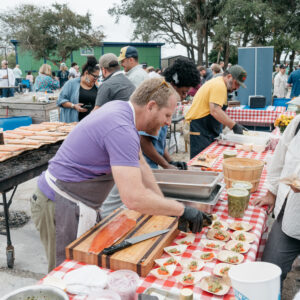
Chef Jaques Larson of The Obstinate Daughter serving wild sockeye salmon crudo with green olive pesto at Bowen’s Island. The salmon was donated by Wild for Salmon. Photo: Ruta Smith.
The afternoon came alive during the Slow Fish Festival, an outdoor, waterside fête hosted and organized by Slow Food Charleston, which celebrated its 20th anniversary. The event drew more than 350 people, including conference attendees and Lowcountry locals. We all indulged in seafood tasting from Charleston’s top chefs, a classic Bowen Island oyster roast, crabbing and fishing demos, fireside chats, and live music. With local vendors and outdoor adventures all around, the day bloomed into a true “shell-abration.”
There were so many standouts from the seafood tastings, but the black cod collars really caught my taste buds’ attention since I’d never tried them before. The buttery flavor of the cod paired well with fresh herbs and the miso aioli. What made it more meaningful, though, was that four local chefs (James London, Chubby Fish; Gabrielle Smith, Hot Box Kitchen; Juan Cassallet, Malagon; Jill Mathias, Chez Nous) crewed together to prepare this dish for, and serve it to, festival attendees.
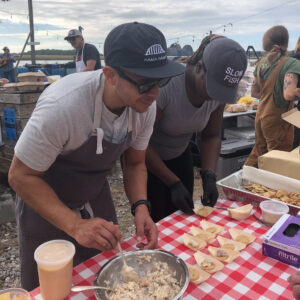
Chefs Juan Cassallet and Gabrielle Smith preparing black cod collars with herbs and miso aioli at Bowen’s Island. The black cod was donated by Seafood Producers Cooperative. Photo: Crowd sourced.
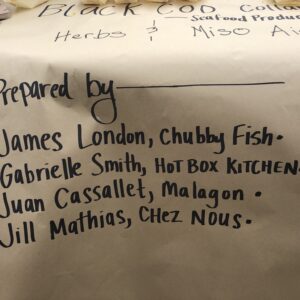
Seafood with values means seafood with a story. Seafood with a story has flavor. Photo: Crowd sourced.
The Heart and the Hustle
A fully volunteer-run event, Slow Fish 2024 embodied the “all hands on deck” spirit, with Slow Fish Charleston members and others toiling behind the scenes to plan, secure venues, coordinate Sunday’s food preparation teams, manage logistics, and spread the word.
The three-day gathering – including what participants could see along with the efforts that took place out of view – was a powerful reminder of why, as Colles often says, “relationships are our greatest resource.”
Top photo: The Slow Fish North America community, with longtime and new members, gathers on the final day celebration at Bowen’s Island wrapping up Slow Fish 2024. Photo: Aruta Smith.


